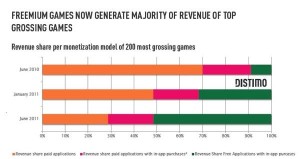Rise of the Freemium-Based Game
by ted2112, HSM team writer
In the era of shrinking video game sales and a customer base spread out among several devices, the video game industry is changing before our very eyes. Here at Home we are lucky. We enjoy a large, free platform with access to well over one hundred free games and endless social activities. The freemium model is a great way to sample what you like and what you don’t, and leads to more symbiotic cooperation between customers and developers. Customer feedback fuels innovation, and innovation drives customers to spend.
This model, however, doesn’t exist everywhere. In fact, the traditional model of creating a game based on the best research and development process, then putting it out there with fingers crossed and hoping for the best, may have worked in the day when competition was a tiny fraction of what it is today. But today’s diversified and busy base of gamers are being chased by far too many companies, and this model is showing its flaws. I feel this is also starting to become counter-productive. The problems are starting to show up in things like:
Rushing products to the market: This, unfortunately, is becoming the norm. More and more, we are being asked to lower our standards, with games fresh out of the package on day one requiring updates to fix flaws the developers were too busy to find as they raced to get their stuff into stores. My favorite example of this was the Nintendo Wii- U. The brand new system needed to re-install its entire flawed operating system before customers could even use it. Not only did this take over an hour with a high speed internet connection, but it killed any momentum Nintendo had gained by rushing out the Wii-U out before the holidays.
 Multiple platform release: The days of the exclusive game are all but over, with the exception of games released by studios directly owned by the console manufacturer. Independents need to have their game on every platform available to recoup the massive investment required for the production of today’s games.
Multiple platform release: The days of the exclusive game are all but over, with the exception of games released by studios directly owned by the console manufacturer. Independents need to have their game on every platform available to recoup the massive investment required for the production of today’s games.
For example, thatgamecompany released one of the biggest blockbusters of 2012 with Journey, yet still hasn’t turned a profit from the game. In fact, the company went into bankruptcy making the game. They were under a three-game agreement with Sony, and as a result Sony owns all the rights and made the money from Journey, not the people who made it. However, thatgamecompany, now free of the three-game deal, has already announced their next game will be a multi-platform game. Interesting enough, thatgamecompany founder Jenova Chen stated in a interview with Joystiq Magazine in June that their next game might very well follow the freemiun business model.
DLC: Yes the dreaded downloadable content. This is ingenious if you think about it. Once you have found your customer base, don’t ever let them off the hook! Make them keep buying the game over and over again. Companies like EA have mastered this with games that only release small segments at a time. The Sims, for example, have regular roll-out of fragmented content that’s all part of the business plan. As much as I hate this philosophy, it seems to be working for them. Even Square Enix jumped into the DLC market with Final Fantasy XIII-2. You start the game with some weak weapons, but you can purchase much stronger ones for a mere three bucks!

Next Generation Games are set to start at $70: Prices for games have steadily risen every year, but seventy dollars a game is starting to push the limit for many gamers. One of the reasons why we have to shell out this much for games is we have to pay for not only the game we are buying, but all the others that company makes as well, and many of those are huge financial failures.
With game-development budgets starting to rival the production costs of big Hollywood films, we customers are being caught in the squeeze. I feel that the more the prices increase, the more consumers will start to favor simpler, cheaper games on more affordable platforms, like their smart phone or the upcoming Android-based gaming system Ouya.
In fact, when Ouya debuts later this year, customers will have the choice of buying the entire console system for a little more then just one next generation game, and the games for about a buck. The gulf between where the traditional console makers are going, and all the new companies sweeping in to pick up all the customers the big guys have left behind is quite large. Time will tell how this polarized new reality will work, but in the big picture, competition is good for everybody.
Perhaps the biggest advantage the freemiun model developers have is far more people trying their product, because it’s free. No need to put down hard-earned money on something that looks good only to be burned. We have all learned that lesson and become the wiser for it. To be fair, the traditional system had already adapted to this new reality. Sony and Microsoft, for example, offer a free trial demo of many games. I have bought several games this way that I would have never have discovered otherwise.
It seems that the traditional video game companies have chosen to pursue a high-tech full-immersion gaming environment, and in many ways that is a good thing. Even the handhelds like the Nintendo 3DS and the Sony Vita are keeping pace. They are pushing the technical and creative boundaries farther — however, developing these systems is expensive. The key is to find balance, and that’s why I feel the freemium model has taken off, not only in gaming, but everywhere. As prices rise, I feel we will see more of the freemiun model from all corners of the industry, because it works to bridge the gap between gamers and developers. And the closer that relationship becomes, the better for everybody.
Share
| Tweet |



 Twitter
Twitter
This is a great read, Ted (as always with your writing) and you make so much sense. I love your articles; I consider them “thought” pieces, as they always make me think and re-think ideas that I’ve had previously.
I am not a fan of the whole Freemium thing. In Home however, it works a treat. This is just down to the nature of Home and the games that are in there; it actually makes sense when you buy tickets in the Midway, when you buy a little extra ‘oomph’ for your racer in S2, or even (although I’m a little loathe to say this due to pricing strategy) when you buy buildings in Tycoon. I think the fact that Home is a microcosm based on microtransactions that these little exchanges never really feel too much like gouging.
In disc-based games though, this whole DLC/pay-to-win ethos just riles me up so much. Like the ENTIRE Cat woman segment of Batman Arkham City, that wasn’t an after-thought for some extra play time like Skyrim’s Hearthfire DLC; it was INTENTIONALLY LEFT OUT so those buying the game at full price on day one didnt realise Rocksteady had their fingers in their back pockets even as they paid for the game at the till in the shop. And the bugs that are allowed to ship with games are also crazy, never mind if they can actually, y’know, PLAY the game they’ve just bought, as long as Mr.Suit And Tie gets his precious monies the rest of us can go spin -- I’m looking at you SimCity. That’s just ONE decent example of what I mean.
Same thing with Darksiders 2. I actually have a friend on my list that’ssuch a big fan of the game he’s used the name of a power-up in it as his PSN name -- but he still warned me not to spend any good money on the sequel until it was fixed when it was first released. “Unplayable” he called it, and was a very disappointed man, as was I.
I heard an apple metaphor here the other day that made me smile, so I’mma borrow that here: If the games industry can get away with selling us rotten apples now with the promise of someone giving them a polish “some time later in the future”, then why spend the time taking them out at all? If we continue to buy them, they’ll continue to sell them to us.
Great read Ted, as ever, and thanks for the brain-taffy to chew on!
Ted always has well thought out articles and i agree, he gave us brain-taffy to chew on (love this analogy). I love this article because it explains so much to me. I like that Home is a freemium model and it was great to see a sample of what Journey is like before I purchased it. Also with the Midway and Casino, I am constantly buying more tickets and tokens because i want to keep upgrading and earning the prizes. I don’t buy many video games but I know if there was more downloadable content on one I bought, I would want it all. I am a marketers dream! I also think when new game comes out it is way overpriced but if its from a series I play, I must have it! This is the case with Kingdom Hearts. Again, great article, can’t wait to read your next one!!!!